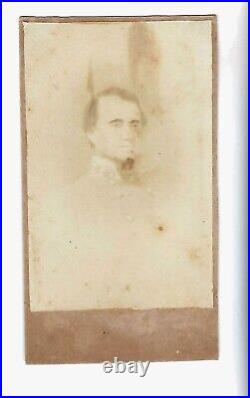Civil War Confederate Salt Print CDV General Gustavus Smith, Ex Turner Coll



From Wikipedia, the free encyclopedia. For other people named Gustavus Smith, see Gustavus Smith (disambiguation). This article needs additional citations for verification.
Please help improve this article by adding citations to reliable sources. Unsourced material may be challenged and removed. Find sources: "Gustavus Woodson Smith" - news · newspapers · books · scholar · JSTOR (June 2020) (Learn how and when to remove this message).
Gustavus Woodson Smith, photo taken during the Civil War 1861-65. June 24, 1896 (aged 74).
New York City, New York. Cedar Grove Cemetery, New London, Connecticut.
Gustavus Woodson Smith (November 30, 1821 - June 24, 1896), more commonly known as G. Smith, was a career United States Army officer who fought in the Mexican-American War, a civil engineer, and a major general in the Confederate States Army during the American Civil War. He briefly commanded the Army of Northern Virginia from May 31 until June 1, 1862, following the wounding of General Joseph E. Johnston at the Battle of Seven Pines, and before General Robert E.
Smith later served as an interim Confederate States Secretary of War and in the Georgia Militia. Smith was born in Georgetown, Kentucky, and was a brother-in-law of Horace Randal and a distant relative of John Bell Hood.
He graduated from the United States Military Academy as a brevet second lieutenant in 1842. Smith finished eighth out of 56 cadets. He entered the United States Army Corps of Engineers afterward and was promoted to second lieutenant on January 1, 1845.
Smith fought in the Mexican-American War, winning two brevet promotions for his actions. On April 18, 1847, he was appointed brevet first lieutenant for his service at the Battle of Cerro Gordo, and on August 20, 1847, brevet captain for his service at the Battle of Contreras. In 1848 he became an original member of the Aztec Club of 1847. On March 3, 1853, Smith was promoted to first lieutenant. He resigned his commission on December 18, 1854, to become a civil engineer in New York City, and was Streets Commissioner there from 1858 to 1861.
Smith's home state of Kentucky became a border state when the American Civil War began in 1861. Some months afterward, Smith presented himself in Richmond, Virginia to serve in the Confederate States Army. Commissioned as a major general on September 19, he served in Northern Virginia as a divisional and "wing" commander.
He fought in the Battle of Seven Pines near Richmond during the Peninsula Campaign. On May 31, 1862, Smith briefly took command of the Army of Northern Virginia after Gen. Johnston was wounded at Seven Pines because he was the senior major general in Johnston's army.
However, Jefferson Davis replaced Smith with Robert E. Lee the following day, June 1. On June 2, Smith became ill and took a leave of absence to recuperate. In addition, he acted as interim Confederate States Secretary of War from November 17 through November 21, 1862.Smith resigned his commission as a major general on February 17, 1863, and became a volunteer aide to General P. Beauregard for the rest of that year. Smith was also the superintendent of the Etowah Iron Works from 1863 until June 1, 1864, when he was commissioned a major general in the Georgia Militia, commanding its first division until the war's end.
